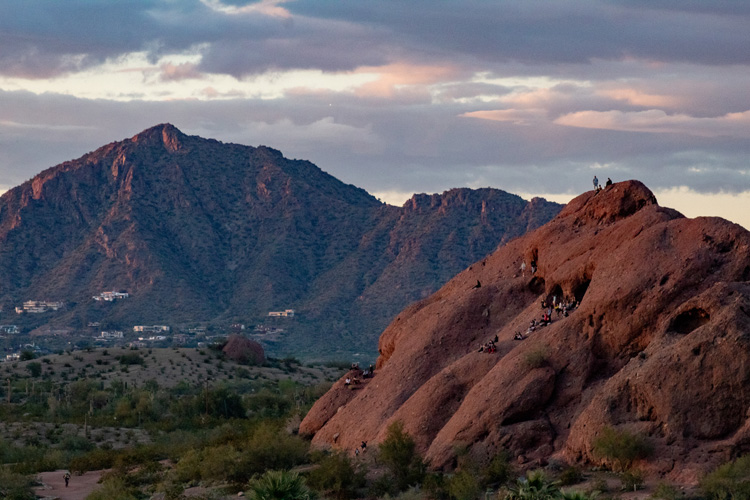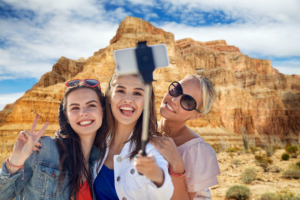Although Gov. Doug Ducey’s stay-at-home order exempts outdoor exercise, some city parks in Arizona are taking measures similar to those park restrictions adopted by Grand Canyon and Saguaro National parks to slow the spread of COVID-19, such as closing certain facilities and limiting access to popular areas.
Phoenix Parks and Recreation over the weekend began limiting access to some of the city’s most popular hiking areas, including Papago Park’s Hole in the Rock and the trailheads at Camelback Mountain’s Echo Canyon and Piestewa Peak.
Gilbert on March 28 closed all town playgrounds and other park amenities, and suspended recreation programs and classes.
The new measures come as Arizona parks and trails have seen a surge of visitors going outdoors as a way to get exercise while keeping social distancing in place due to the COVID-19 outbreak.
Saguaro National Park near Tucson has temporarily closed restrooms and visitor centers and halted public events.
Andy Fisher, chief of interpretation and a spokesman for the park, said the trails last weekend were packed.
“We had a couple instances where cars were creating their own parking spots,” he said. “There were several hundred people that were gathering kind of through one of our major trailheads, which of course is not social distancing.
“March tends to be our busiest month of the year anyway. I think because there are closures around the community that there are folks that are finding their way to us.”
On March 19, Gov. Doug Ducey ordered the closure of bars, gyms and many restaurants, yet most of Arizona’s city, county, state and national parks remain open during the COVID-19 outbreak. Last week, Ducey issued an executive order that outlines essential services that will remain open, including outdoor recreation.
As of March 24, Petrified Forest National Park has temporarily closed, and Monument Valley Tribal Park, which includes Antelope Canyon and Canyon de Chelly on the Navajo Nation Reservation, has closed all its parks.
Grand Canyon National Park remains open with limited services, but it recently announced modifications to river operations. Grand Canyon river rafting trips are also suspended until May 21.
Surprise last Tuesday closed all city park amenities and facilities “to minimize the potential spread of illness to reduce opportunities to gather,” according to the Surprise Parks & Recreation website. However, most Arizona state and national parks are only closing indoor facilities and programs, and keeping outdoor activities open to the public.
Phoenix Parks and Recreation last weekend started limiting access to many of the city’s most popular hiking areas, including Papago Park, Camelback Mountain, South Mountain and Piestewa Peak.
The main parking lot for Hole in the Rock at Papago Park is closed as of March 28, and access for hikers is limited. However, other parking lots and trails at Papago Park remain open for now.
Although Cholla Trail at Camelback Mountain is closed for two weeks, Echo Canyon Trailhead is open with traffic and parking controls to prevent overcrowding. Both Pima Canyon Trailhead and Dobbins Lookout in South Mountain, as well as Piestewa Peak Trailhead, are still accessible with traffic and parking controls in place.

Phoenix Parks and Recreation spokesman Gregg Bach said this time of year is always busy on the trails because of the weather and tourism, and that the volume of traffic now occurring from social distancing “is a very similar volume as to what we would have normal times of the year.”
City parks director Inger Erickson, in an interview with Arizona Horizon on Wednesday, said, “We saw a spike on the weekend, but in the last couple of days we’ve actually seen it level out to our normal numbers that we would see on a typical spring day.”
Currently, Maricopa County has the highest number of COVID-19 cases in Arizona. But despite this, most parks in metro Phoenix remain open.
In a statement to Cronkite News, the Maricopa County Parks and Recreation Department said it has “canceled all park programs and events, closed all park nature centers and group ramada reservations, closed group/youth campgrounds, and stopped accepting future reservations for these areas.”
The county is advocating social distancing – staying 6 feet apart – to slow the spread of novel coronavirus, the respiratory virus that causes COVID-19. Bach said that Phoenix Parks and Recreation is using “education and communication” to prevent the spread of COVID-19.
“Our preference really is to keep these amenities open and to educate people year-round on a variety of things that they need to do to be safe,” Bach said.
Phoenix Parks and Recreation is using infographics that lay out social distancing in public parks and trails as a way to help educate people.
“The National Recreation and Parks Association put out some great guidelines that we’ve posted,” Erickson said. “We’ve posted in English and Spanish at our trailheads, and we’ve also posted more specifics, like wash your hands, if you’re sick don’t come to this facility, don’t use this trail.”
Amy Hagin, park manager for Flagstaff, said her staff is seeing a higher number of people using trails rather than parks. She said she believes this is because residents are using their neighborhoods to get fresh air rather than going to public places.
“We’re seeing a lot of walking on the streets and sidewalks,” Hagin said. “I think people are taking those mental health breaks outside as they can, but still providing that physical distancing and social distancing.”
In Phoenix, Erickson said the city wants to keep the parks and the trails open. However, she said they are emphasizing that people be mindful to bring their own wipes, hand sanitizers, and other items to keep themselves safe.
“We look at things every day,” Erickson said. “We communicate twice a day on what people are seeing, so that we make sure we’re addressing the need in a timely fashion.”
Bach, the Phoenix Parks spokesman, said Arizonans value parks and trails.
“Now I think people are valuing it even a little bit more,” he said. “We just need to keep people mindful and make sure that they’re doing it responsibly in terms of all the current events that are going on.”
Story by Caroline Linch, Cronkite News




